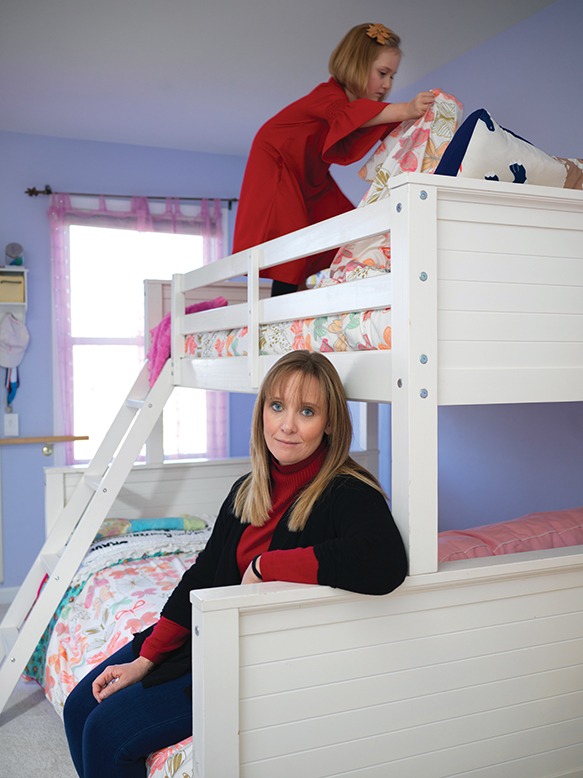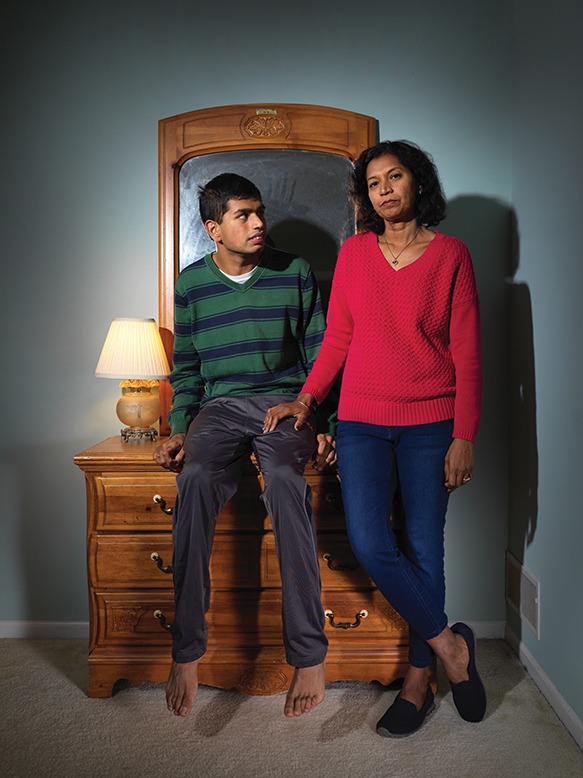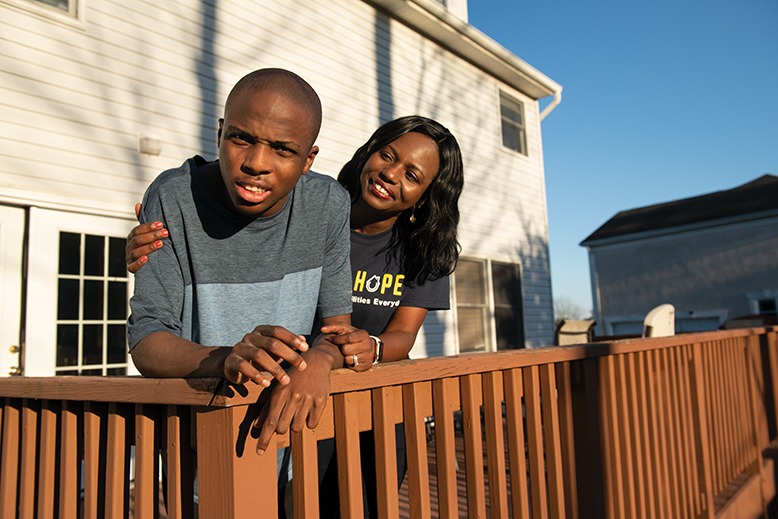
It took Ellie North six months to get an appointment with a developmental pediatrician for her daughter, Seraphina—and three crucial years to fight for insurance coverage. Photo by John Emerson
When Ellie North noticed her 2-year-old daughter, Seraphina, retreating into herself, she took her to three doctors. The first said North wasn’t spending enough time with her little girl. Another said Seraphina was a late talker. The third told her, wrongly, that girls don’t get autism. Eventually, when the nurse practitioner at her pediatrician’s office confirmed North’s suspicions that Seraphina was autistic, it took six months to get an appointment with a developmental pediatrician.
In New Jersey, finding health care providers trained to care for children on the autism spectrum can be daunting. That goes for general health needs, including primary care doctors, dentists, counselors, psychiatrists and therapists. But it also applies to practitioners specific to autism, like behavioral therapists. And even when families find the right provider, insurance coverage can be spotty. These problems often intensify as children age out of pediatric care into adulthood.
North’s insurance at the time of Seraphina’s diagnosis did not cover autism-related services. Fighting for coverage—“literally a full-time job,” says North—took three crucial years at a time when Seraphina would have gotten the most benefit from behavior and speech therapy.
“I remember lying in bed around her fifth birthday,” says North. “I hadn’t gotten insurance and services secured yet, and I just remember sobbing and thinking I failed her.”
Autism is a developmental disorder with a wide range of symptoms, including difficulties with social interactions and communication. Because its severity varies, it’s known as autism spectrum disorder. Of children on the autism spectrum, 44 percent have IQ scores in the average or above-average range. Others are severely disabled; one-third are unable to speak.
As has been widely reported, New Jersey has the highest prevalence of children with autism spectrum disorder in the nation. Among 8-year-olds, one child in 34 is on the spectrum, a rate that increased 43 percent between 2010 and 2014. While the causes behind these figures are uncertain, some cite high detection rates in New Jersey, as well as genetic and environmental factors.
A 2017 Rutgers Robert Wood Johnson Medical School study found only 1,000 developmental pediatricians nationwide and an average 5.5-month wait for a first appointment. In New Jersey, only 39 board-certified pediatricians are sub-certified in developmental behavioral pediatrics. The New Jersey chapter of the American Academy of Pediatrics confirms that waits of a year are common for initial appointments.
Some parents observe that general health care providers are not properly trained to work with people on the spectrum. Manisha Lad of Edison bristles when staff members at a doctor’s office ask her, not her 18-year-old son, Akhil, if he can swallow pills.
[RELATED: An Immersive Play Space for People with Special Needs]
“They don’t even give that respect,” she says.
But it’s not just the doctors who are often unprepared to treat patients on the spectrum. Even the environment matters.
Dr. Malia Beckwith, head of developmental behavioral pediatrics at Children’s Specialized Hospital in Mountainside, says children on the spectrum often can’t spend an hour in a waiting room, where crowds or excessive noise can cause a sensory overload.
Beckwith took part in a RWJBarnabas Health training program called Project ECHO, showing pediatricians how to work with children on the spectrum and create autism-friendly settings. For example, some doctors put maps of their offices online and describe the steps in a visit, in words or pictures, to help patients who need structure and routine. Some practices have set aside calm-down rooms or encourage the use of noise-cancelling headphones.
In addition to its special-needs services, Children’s Specialized Hospital has a primary pediatric practice for families that have had trouble finding doctors comfortable with special needs. It also has a rehabilitation wing for children recovering from illness or surgery. The unit keeps patients on a careful schedule, with several quiet times throughout the day.
People on the spectrum often require more time from doctors because of difficulties in communicating and in functioning outside their routines. That can mean patient visits don’t always conform to insurance guidelines.
Dr. Alison Smoller, a developmental pediatrician, does not accept insurance at all. She says that allows her to give new patients with special needs at least two hours for their first appointment, when she makes a full assessment and discusses treatment options. All patients must pay out of pocket.
“Reimbursement from insurance companies is so low that it would be impossible to sustain my practice,” she says. “I would be forced to shorten my visits in order to allow more patients to be seen.” She estimates her practice, Developmental Pediatrics of Central Jersey, in Ocean Township, saw 218 new patients in 2019 with special needs, including autism.
* * *

Shanthini Lawrence had to travel an hour or more to find specialists or even a dentist to care for her son Mervin, now 21. Insurance coverage was also a problem. “We paid out of pocket for a lot of things,” says the Hamilton mom. Photo by John Emerson
Most children on the spectrum require more care than pediatricians can provide. Because autism comes with higher-than-usual rates of epilepsy, attention deficit and hyperactivity disorder (ADHD), anxiety, sleep problems and gastrointestinal disorders, families often need specialists in those areas, but finding ones trained to work with this population—and who accept insurance—can be next to impossible.
Shanthini Lawrence remembers that when her son, Mervin, now 21, was younger, the only pediatric neurologist she could find was through Children’s Hospital of Philadelphia, an hour away from her home in Hamilton. However, that doctor wouldn’t see Mervin because he was not having seizures. As a result, the boy did not see a neurologist during his entire childhood.
“The list was so small for specialists,” says Lawrence. Her son needed an endocrinologist, otolaryngolist (an ear, nose and throat specialist), psychologist, psychiatrist and dentist. Often, the only available doctor was far away. And her insurance didn’t cover mental health services. “We paid a lot out of pocket for a lot of things,” she says.
Even twice-yearly visits to the dentist can be complicated for families with someone on the spectrum. Teresa Taylor of West Windsor could not find dental care for her son for several years. Lad describes a dentist who put her son, then 10, in a restraint, called a papoose, to fill a cavity. Her son was crying and unable to walk afterwards; she took him to a hospital for subsequent dental treatment. North says her daughter needs anesthesia for regular dental checkups. The care is costly; the co-pay for a regular exam under anesthesia is $5,000; the same goes for a root canal. Without insurance, each would have cost $13,000, she says.
Insurance coverage for people on the spectrum is inconsistent. Covered services vary depending on whether the family is insured through an individual plan on the health care exchanges, an employer-based plan (some of which are self-funded by the employer); or government-sponsored coverage (such as Medicare or Medicaid). While New Jersey state law mandates that private insurers cover autism services, self-insured plans are not required to follow state rules. (Autism New Jersey, a nonprofit advocacy group, provides a helpline, 800-4-AUTISM, for families with questions on insurance matters.)
* * *
The difficulty of finding behavioral therapy for children on the spectrum is especially troubling, because such therapy can help those children become more independent adults. Suzanne Buchanan, the executive director of Autism New Jersey, says 30 percent of children who receive high-quality, intensive Applied Behavior Analysis (ABA) therapy—which adjusts social behaviors—become indistinguishable from their neurologically typical peers. But an estimated 2 percent of children on the spectrum receive that level of therapy, which works best for children under five and involves 20–40 hours of one-on-one interactions a week.
While the state mandates that private insurance must cover such therapy, not all self-funded plans do so, and Medicaid covers ABA only through a pilot program, primarily for older children. Even when ABA is covered, families may have difficulty finding qualified therapists willing to work for low reimbursement rates, sometimes the equivalent of minimum wage.
Finding appropriate and affordable mental health care is also a challenge for people on the autism spectrum. Sher Genova of Flemington reports searching for three years to find a psychiatrist to treat her son. Long waits are common even for people who need immediate help. And Buchanan echoes parents’ complaints that few psychiatric hospitals or outpatient programs accept children with autism. Fewer still are prepared to provide the specialized care they need.
Sometimes, children and adults with autism have episodes of violence that put themselves and their caregivers at risk. Parents and experts tell of individuals on the spectrum who hit themselves in the head repeatedly, hard enough to detach a retina, and parents who get concussions and bruises while trying to keep their children from hurting themselves.
According to Autism New Jersey, 24,000 children and adults in the state engage in “severe challenging behavior.” Their families have few options when outbursts occur. Some counties have mobile crisis units that can come to a home and help calm people down. But parents report that some of the crisis units don’t operate on weekends. Others have inexperienced workers or refuse to send staff into dangerous situations. Some have lost their funding.
Paul Aronsohn, the state’s ombudsman for individuals with intellectual or developmental disabilities and their families, is concerned by the lack of services available for families in such crises. If an ambulance takes them to an emergency room, doctors often don’t know how to treat them. In some cases, it’s “anywhere between three hours and three weeks before being discharged on a mix of psychotropic medicines,” he reports.
Such tales are harrowing, but more so for poor families, where the breadwinners have to work multiple jobs, leaving little time to fight autism-related battles.
“The kids whose parents [through no fault of their own] don’t have the resources or the knowledge end up being much more traumatized,” says Jen Schonger, of East Windsor, whose 6-year-old daughter is on the spectrum. “They’re not being given adequate opportunities, their medical needs get ignored, and people might be attributing the way they act to behavior, when their legitimate medical needs are not being addressed.” She cites a study from the U.S. Commission on Civil Rights that showed that a disproportionate number of children of color with disabilities end up in prison.
* * *
For parents with children on the spectrum, life gets more complicated in adulthood. In New Jersey, young people with autism receive school-based services through age 21, leaving them and their families with a difficult transition into adulthood.
“We kind of live in a society where people’s image of autism is focused around children. We see such a huge fall off the cliff at 21, when we’re out of school, in terms of supports needed and in terms of health care overall,” says Kerry Magro, an advocate and public speaker about autism, who lives in Hoboken. “Not only is there a lack of overall health care opportunities, there’s also a lack of education about adults with autism and the supports we truly need.”
Aronsohn adds that, because adults on the spectrum typically receive Medicaid, they often find fewer health care practitioners who accept that program’s historically low reimbursements.
The Arc of New Jersey helps young adults and their families find medical support. Beverly Roberts, of the nonprofit’s mainstreaming medical care program, says that, under state law, some young adults with autism are able to stay on their parents’ private health insurance even past age 26. (Parents must make the request before the individual turns 26.) In addition, the Children’s Hospital of Philadelphia runs the New Jersey Transition to Adult Coordinated Care, based in Plainsboro, another group helping young adults move from pediatricians to adult primary care doctors and specialists.

Genevieve Kumapley is concerned about where she’ll find caregivers for her son Nicholas, who is 18 and has complex medical needs. She believes the state should require doctors to learn more about caring for people with disabilities. Photo by John Emerson
Genevieve Kumapley, who has worked with that group, says some pediatricians will keep seeing patients up to age 30, which isn’t ideal. “There needs to be a physician specialty in the area of developmental disabilities,” she says. Her son Nicholas is 18 and has complex medical needs.
“We have not fully put together a team for him that can take care of him,” says Kumapley, a pharmacist. She wishes the state would require doctors to take some of their continuing-education credits in topics related to disabilities, much as pharmacists have been required to learn about the opioid epidemic.
There has been some progress. Some state institutions are training more health-care providers on the needs of people on the spectrum. Based at Rutgers Robert Wood Johnson Medical School, the federally funded Leadership Education in Neurodevelopmental Disabilities (LEND) program provides 300 hours of training in culturally appropriate care for children on the spectrum, aimed at graduate fellows in health-related disciplines, family members and self-advocates. Every medical student at the school must take a seminar as part of the curriculum and visit the family home of a person with disabilities. At Children’s Specialized Hospital, medical residents do rotations to learn about pediatric disabilities.
Still, much of the work falls to parents of young people on the spectrum.
“Parents have had to create their own support group, and social media has been a blessing to them,” says Liz Torres, the principal investigator at the New Jersey Autism Center of Excellence. While many find it difficult to make face-to-face meetings, online or phone services help them get and share information without having to drive or find babysitters.
The search for services can be exhausting. Ellie North, who lives in Warren County, where services are scarce, knows this firsthand. “I’m not going to stop until I get her to her best life,” she says of her daughter, now 6. “I think most special-needs parents are like that.”
WHEN EMERGENCIES STRIKE
Emergency situations can be especially problematic for people with autism. Loud noises, bright lights, barking police dogs, and strangers can all trigger sensory overload.
“A trip to the ER is every parent’s nightmare,” says Franny Hines, autism and special-needs coordinator for the Monmouth County Sheriff’s office. He notes that emergency vehicles and emergency rooms tend to be bright and noisy, with lots of beeping machines. That can be “intimidating for a kid on the spectrum with sensory issues.”
Monmouth County trains its police recruits to work with people with autism and other disabilities, and it keeps a voluntary registry of people with special needs, including sensitive ways to approach them.
“The kid has already had a bad day because you’re there. They’re sick or injured, and leery of everybody,” says Hines. “If he’s hurt or in pain, his anxiety level will go to a point where he’s going to be unreachable.”
Hines, a longtime emergency medical technician, runs a state-approved training class that provides continuing-education credits for EMTs.
“A little bit of awareness goes a long way,” Hines says. He wishes ambulances could take people on the spectrum to emergency rooms staffed by people trained in soothing patients in such chaotic environments, but he is not aware of any in the state.
